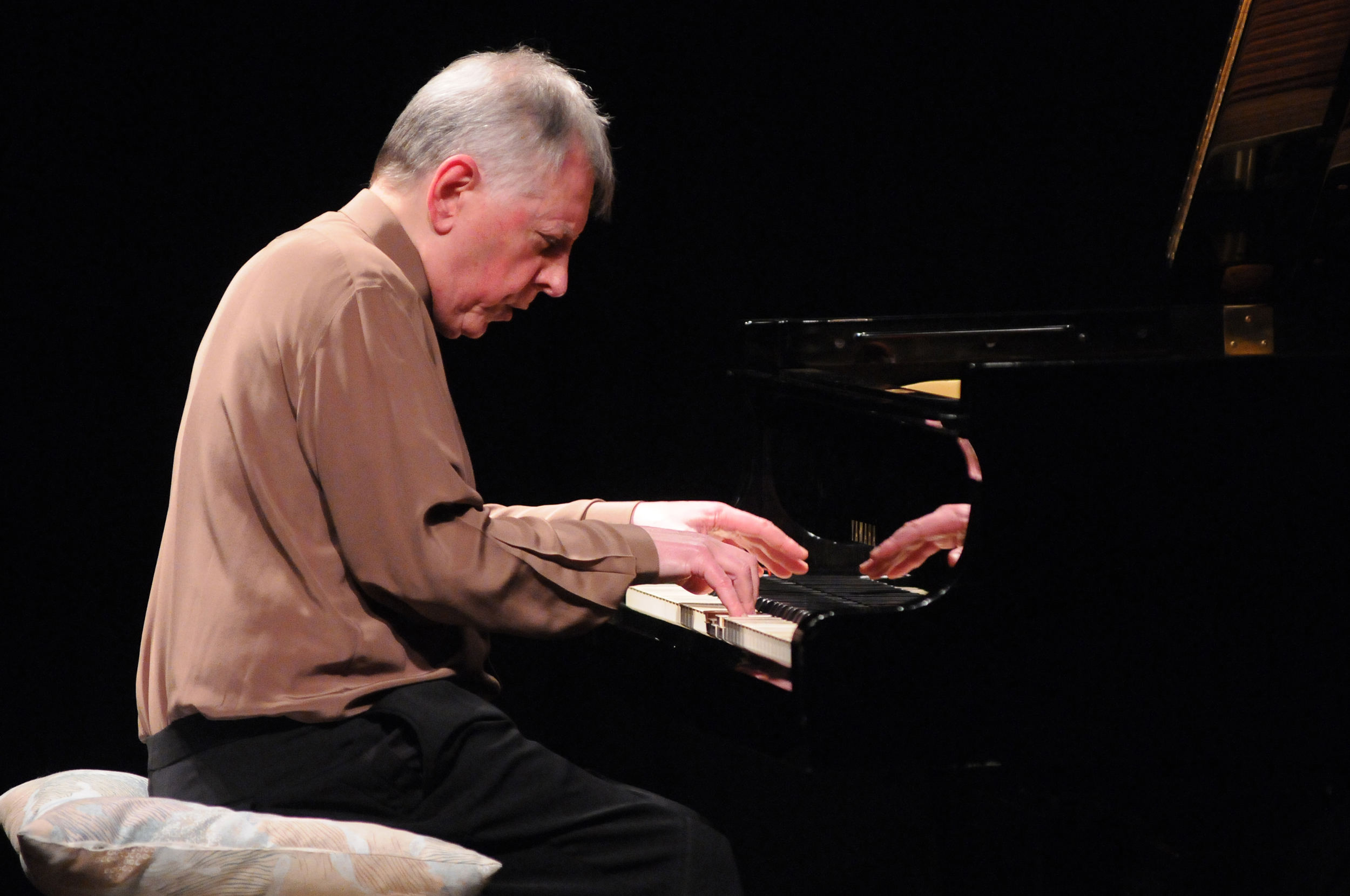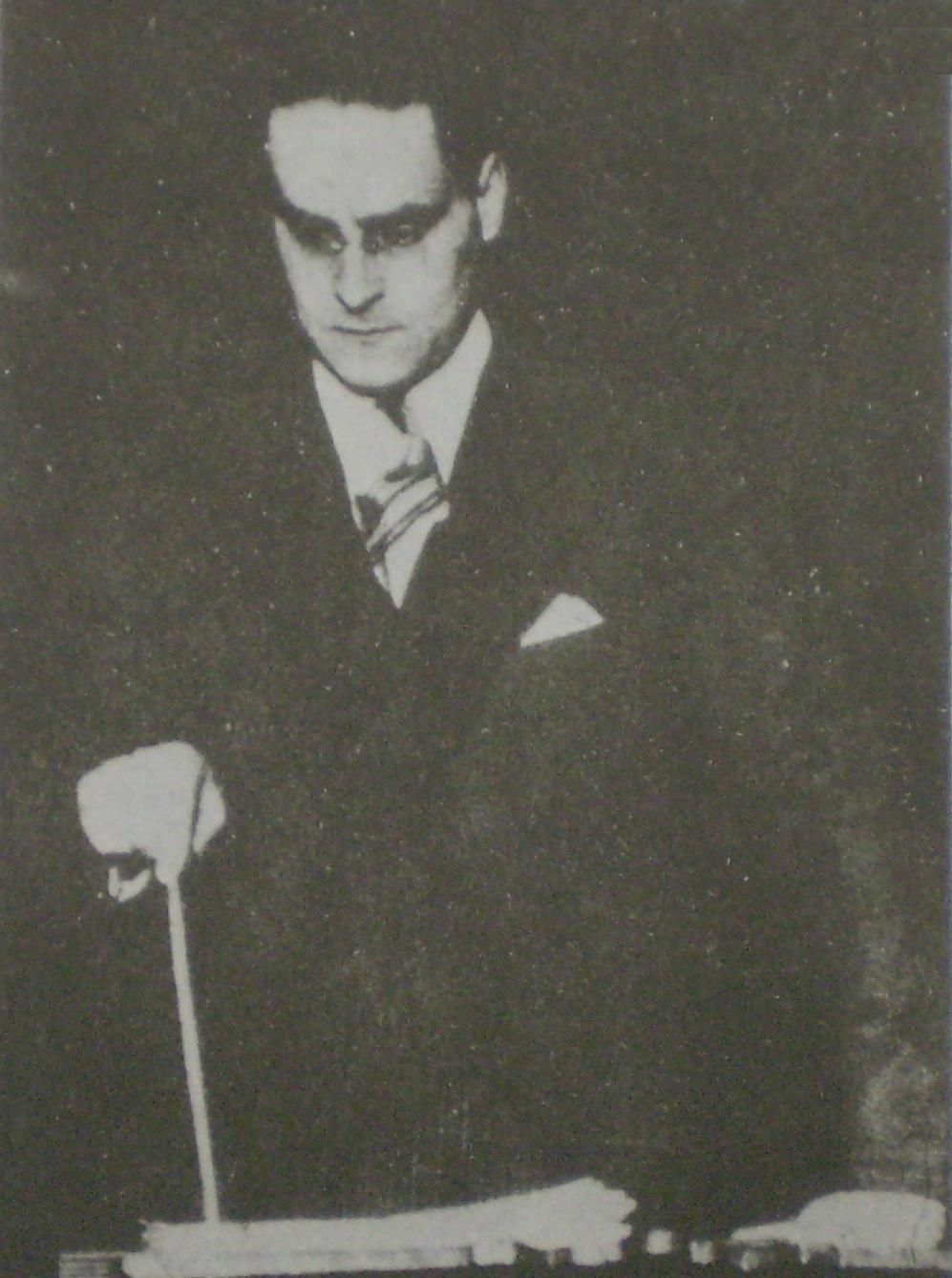|
Eduardo Delgado
Eduardo Delgado (born October 3, 1943) is an Argentine classical pianist and teacher living in California. Born in Rosario, Argentina, Delgado is a recipient of the Vladimir Horowitz Award and has received grants from the Mozarteum Argentino, Martha Baird Rockefeller, and the Concert Artists Guild. In 1999, he was awarded by UNESCO in Buenos Aires. Delgado has given recitals all over the world, in Europe, Asia, South America and North America. Mentoring Delgado has participated in international competition juries such as the William Kapell, the Gina Bachauer, and the Vega in Japan and in 2003 he served as a juror in the 2nd Martha Argerich International Piano Competition in Buenos Aires. In 2009 he was a member of the jury at the San Antonio International Piano Competition. He is also noted for his extensive work in teaching in universities and workshops in Japan, mentoring, among others, Japanese pianist Atsuko Seta. He is a part-time instructor at the California State Univ ... [...More Info...] [...Related Items...] OR: [Wikipedia] [Google] [Baidu] |
Richard Nixon Presidential Library And Museum
The Richard Nixon Presidential Library and Museum is the presidential library and burial site of Richard Milhous Nixon, the 37th president of the United States (1969–1974), and his wife Pat Nixon. Located in Yorba Linda, California, on land that President Nixon's family once owned, the library is one of 13 administered by the National Archives and Records Administration (NARA). The campus is located at 18001 Yorba Linda Boulevard in Yorba Linda and incorporates the Richard Nixon Birthplace, a National Historic Landmark where Nixon was born in 1913 and spent his childhood. From its dedication on July 19, 1990, until July 11, 2007, the library and museum was operated by the private Richard Nixon Foundation and was known as the Richard Nixon Library & Birthplace. The facility underwent an extensive renovation in 2016 and now features updated, multimedia museum exhibits; the complex is jointly operated by NARA and the Richard Nixon Foundation. Background prior to dedication H ... [...More Info...] [...Related Items...] OR: [Wikipedia] [Google] [Baidu] |
Liszt
Franz Liszt, in modern usage ''Liszt Ferenc'' . Liszt's Hungarian passport spelled his given name as "Ferencz". An orthographic reform of the Hungarian language in 1922 (which was 36 years after Liszt's death) changed the letter "cz" to simply "c" in all words except surnames; this has led to Liszt's given name being rendered in modern Hungarian usage as "Ferenc". From 1859 to 1867 he was officially Franz Ritter von Liszt; he was created a ''Ritter'' (knight) by Emperor Francis Joseph I in 1859, but never used this title of nobility in public. The title was necessary to marry the Princess Carolyne zu Sayn-Wittgenstein without her losing her privileges, but after the marriage fell through, Liszt transferred the title to his uncle Eduard in 1867. Eduard's son was Franz von Liszt., group=n (22 October 1811 – 31 July 1886) was a Hungarian composer, pianist and teacher of the Romantic period. With a diverse body of work spanning more than six decades, he is considered to be one of ... [...More Info...] [...Related Items...] OR: [Wikipedia] [Google] [Baidu] |
Robert Schumann
Robert Schumann (; 8 June 181029 July 1856) was a German composer, pianist, and influential music critic. He is widely regarded as one of the greatest composers of the Romantic era. Schumann left the study of law, intending to pursue a career as a virtuoso pianist. His teacher, Friedrich Wieck, a German pianist, had assured him that he could become the finest pianist in Europe, but a hand injury ended this dream. Schumann then focused his musical energies on composing. In 1840, Schumann married Friedrich Wieck's daughter Clara Wieck, after a long and acrimonious legal battle with Friedrich, who opposed the marriage. A lifelong partnership in music began, as Clara herself was an established pianist and music prodigy. Clara and Robert also maintained a close relationship with German composer Johannes Brahms. Until 1840, Schumann wrote exclusively for the piano. Later, he composed piano and orchestral works, and many Lieder (songs for voice and piano). He composed four symphonies ... [...More Info...] [...Related Items...] OR: [Wikipedia] [Google] [Baidu] |
Carlos López Buchardo
Carlos Félix López Buchardo (October 12, 1881 – April 21, 1948) was an Argentine composer of Classical music whose work was inspired by native music. He founded the Conservatorio Nacional Superior de Música in Buenos Aires, an institution that later became a department (Departamento de Artes Musicales y Sonoras "Carlos López Buchardo") of the current Universidad Nacional de las Artes. Life Carlos López Buchardo was born and died in Buenos Aires. He first studied composition in his hometown and later pursued his training in Paris with Albert Roussel. Upon his return to Argentina, López Buchardo established some institutions that helped to shape musical life in his country. He founded the Conservatorio Nacional in Buenos Aires in 1924. [...More Info...] [...Related Items...] OR: [Wikipedia] [Google] [Baidu] |
Antonio Tauriello
Antonio is a masculine given name of Etruscan origin deriving from the root name Antonius. It is a common name among Romance language-speaking populations as well as the Balkans and Lusophone Africa. It has been among the top 400 most popular male baby names in the United States since the late 19th century and has been among the top 200 since the mid 20th century. In the English language it is translated as Anthony, and has some female derivatives: Antonia, Antónia, Antonieta, Antonietta, and Antonella'. It also has some male derivatives, such as Anthonio, Antón, Antò, Antonis, Antoñito, Antonino, Antonello, Tonio, Tono, Toño, Toñín, Tonino, Nantonio, Ninni, Totò, Tó, Tonini, Tony, Toni, Toninho, Toñito, and Tõnis. The Portuguese equivalent is António (Portuguese orthography) or Antônio (Brazilian Portuguese). In old Portuguese the form Antão was also used, not just to differentiate between older and younger but also between more and less important. In Galician the ... [...More Info...] [...Related Items...] OR: [Wikipedia] [Google] [Baidu] |
Alicia Terzian
Alicia Terzian (born 1 July 1934) is an Argentine conductor, musicologist and composer of Armenian descent. Biography Alicia Terzian was born in Córdoba, Argentina. She studied at the National Conservatory of Buenos Aires under Alberto Ginastera, Gilardo Gilardi, Roberto García Morillo and Floro Ugarte. She received a degree in piano in 1954 and a degree in composition in 1958. In 1962 she continued her studies in electronic music and medieval Armenian church music with Father Leoncio Dayan at the Mekhitarist Monastery of San Lazzaro degli Armeni, Venice. After completing her studies, Terzian taught music in Argentina at the National Conservatory, the Municipal Conservatory of Buenos Aires, the Universidad Nacional de La Plata and at the Art Institute of the Teatro Colón. She founded the Fundación Encuentros Internacionales de Música Contemporánea (EIMC) festival in 1968 and the Grupo Encuentros in 1979. Terzian has served as a member of the Music Council of UNESCO Th ... [...More Info...] [...Related Items...] OR: [Wikipedia] [Google] [Baidu] |
Juan José Castro
Juan José Castro (March 7, 1895September 3, 1968) was an Argentine composer and conductor. Born in Avellaneda, Castro studied piano and violin under Manuel Posadas and composition under Eduardo Fornarini, in Buenos Aires. In the 1920s he was awarded the Europa Prize, and then went on to study in Paris at the Schola Cantorum under Vincent d'Indy and Édouard Risler. Returning to Buenos Aires in 1925, he was named conductor of the Renacimiento Chamber Orchestra in 1928 and the Teatro Colón in 1930. From 1939 to 1943 he was a professor at the Buenos Aires Conservatory. Castro's international career began in the 1940s. In 1947 he conducted the Havana Philharmonic, and the Sodre Orchestra in Uruguay in 1949. In 1952-53 he was the conductor of the Melbourne Symphony Orchestra (then known as the Victorian Symphony Orchestra) in Australia. He returned to the Americas and conducted the National Symphony in Buenos Aires from 1956-1960. From 1960 to 1964, he was director of the Con ... [...More Info...] [...Related Items...] OR: [Wikipedia] [Google] [Baidu] |
Alberto Williams
Alberto Williams (23 November 1862 – 17 June 1952) was an Argentine composer, pianist, pedagogue, and conductor. Life and work Alberto Williams was born in Buenos Aires, in 1862. His maternal grandfather, Amancio Jacinto Alcorta, had been a respected diplomat and economist, and an amateur composer of salon music. Williams began studying the piano at age 8 with Pedro Beck. Six years later, he entered the ''Escuela de Música y Declamación'' (School of Music and Recitation) of the Province of Buenos Aires, where he received piano lessons from Luis José Bernasconi. He received a scholarship from the government of the Province of Buenos Aires in 1882 to study music composition at the Paris Conservatoire, where he was mentored by pianists Georges Mathias and Charles de Bériot, and learned harmony with Emile Durand and counterpoint with Ernest Guiraud. He furthermore took private lessons in composition from César Franck, who apparently became very fond of his student. Will ... [...More Info...] [...Related Items...] OR: [Wikipedia] [Google] [Baidu] |
Carlos Guastavino
Carlos Guastavino (5 April 1912 – 29 October 2000) was an Argentine composer, considered one of the foremost composers of his country. His production amounted to over 500 works, most of them songs for piano and voice, many still unpublished. His style was quite conservative, always tonal and lushly romantic. His compositions were clearly influenced by Argentine folk music. His reputation was based almost entirely on his songs, and Guastavino has sometimes been called "the Schubert of the Pampas". Some of his songs, for example ''Pueblito, mi pueblo'', ''La rosa y el sauce'' ("The Rose and the Willow") and '' Se equivocó la paloma'' ("The Dove Was Mistaken"), became national favorites. Unlike most other composers, at any time or place, Guastavino earned enough from his royalties and performing rights that he had little need for other income.MacDonald, Callum. Essay in booklet with the recording ''Carlos Guastavino: The Complete Piano Music'', Martin Jones, piano. Nimbus, NI 58 ... [...More Info...] [...Related Items...] OR: [Wikipedia] [Google] [Baidu] |
Alberto Ginastera
Alberto Evaristo Ginastera (; April 11, 1916June 25, 1983) was an Argentinian composer of classical music. He is considered to be one of the most important 20th-century classical composers of the Americas. Biography Ginastera was born in Buenos Aires to a Spanish father and an Italian mother. During his later years, he preferred to use the Catalan and Italian pronunciation of his surname – , with an initial soft 'G' like that of English 'George' – rather than with a Spanish 'J' sound (). Ginastera studied at the Williams Conservatory in Buenos Aires, graduating in 1938. As a young professor, he taught at the Liceo Militar General San Martín. After a visit to the United States in 1945–47, where he studied with Aaron Copland at Tanglewood, he returned to Buenos Aires. He held a number of teaching posts. Among his notable students were Ástor Piazzolla (who studied with him in 1941), Alcides Lanza, Jorge Antunes, Waldo de los Ríos, Jacqueline Nova and Rafael Aponte-Ledé ... [...More Info...] [...Related Items...] OR: [Wikipedia] [Google] [Baidu] |




